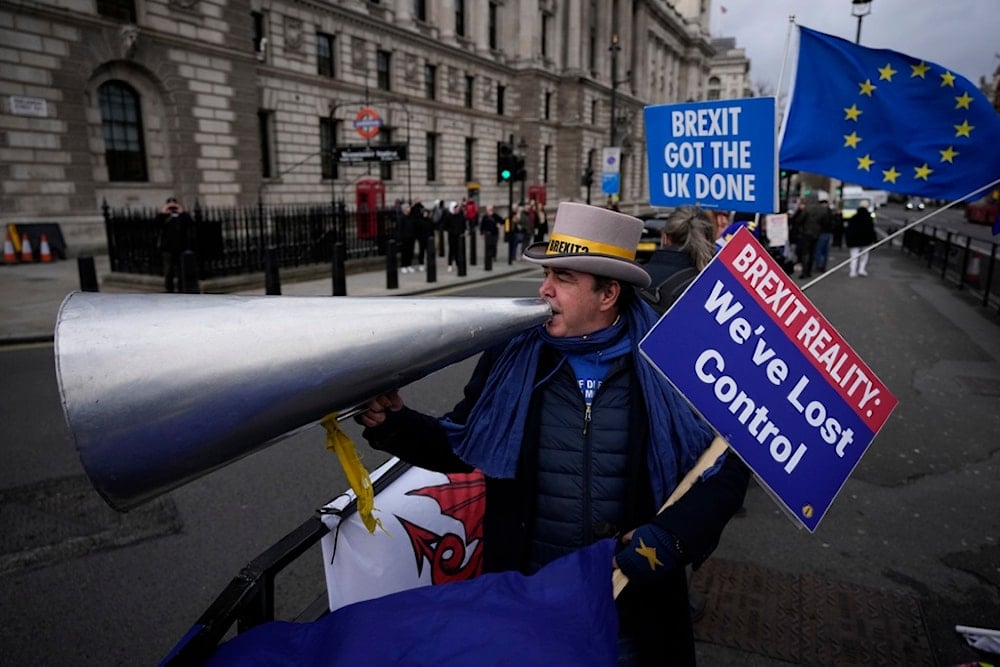Clear majority of Britons think Brexit was a failure: Poll
Brexit has contributed to a regression in the economy, increased prices of consumer goods in shops, and obstructed government attempts to regulate immigration.
-

Anti-Brexit protester Steve Bray demonstrates on the edge of Parliament Square across the street from the Houses of Parliament, in London, Wednesday, Dec. 8, 2021 (AP)
The clear majority of UK citizens believe that Brexit was a failure on the country's part, a poll by Opinium showcased. On its third anniversary, Brexit has contributed to a regression in the economy, increased prices of consumer goods in shops, and obstructed government attempts to regulate immigration, poll takers revealed.
Over 2000 voters took the poll. Only one in ten thought Brexit was beneficial to them and the country. Meanwhile, 35% of voters thought it negatively affected their finances, and only 9% thought it profited National Health Services (NHS) versus 47% who disagreed.
As PM Rishi Sunak promptly backed Brexit for its economic benefits, only 7% of poll-takers thought it brought economic profit, while a whopping 63% believed it surged inflation and furthered the living crisis.
Boris Johnson and Michael Gove, while advocating for Brexit through the Vote Leave Campaign, guaranteed that it would boost the economy and trade, bring in a weekly 350 million pounds to the NHS, and impose more governmental control at the borders.
However, citizens clearly disagree. James Crouch, head of policy and public affairs at Opinium, said, “More than half (53%) of leave voters now think that Brexit has been bad for the UK’s ability to control immigration, piling even more pressure on an issue the government is vulnerable on. Despite this, Brexit is likely to be a secondary issue at the next election compared to the state of the economy and the NHS, which are the clear priority for voters.”
According to Robert Ford, a political science professor at Manchester University, there is currently evidence suggesting that negative views of Brexit, especially concerning the economy, may influence voting patterns in a general election. However, he believes that Brexit is unlikely to have as direct an impact as it did in the last two general elections.
Ford further analyzed, "Voters have shifted their focus away from Brexit, and both leave and remain supporters are now more concerned with domestic issues such as increasing bills, struggling public services, and weak economic growth. The promise of "Get Brexit Done" was not just about completing the Brexit process but also addressing long-neglected problems."
However, despite Brexit being accomplished, the political system remains blocked, and challenges in other areas have intensified. Many who supported the Conservatives for change now believe that achieving change requires removing the Conservatives from power, he added.
Brexit supporters previously asserted that leaving the EU's single market and customs union would lead to increased global trade through new agreements. However, a substantial number of voters now believe that Brexit has negatively impacted trade. About 49% believe it has hindered the ability of UK firms to import goods from outside the EU, while only 15% think it has been beneficial.
Read more: Brexit cost penalty worth £29 bln on UK productivity: Bank Of England
Britain rejoins EU's Horizon Programme following Brexit
Previous polls conducted by YouGov revealed that UK citizens would rather rejoin the EU following Brexit.
In September, Britain rejoined the EU's Horizon research program, something that experts have warned should not be immediately celebrated.
The final revelation that ministers had agreed to rejoin Horizon was met with pleasure and relief by many prominent scientists, after years of Brexit.
However, several scientists have now cautioned that the inability to access Horizon for so long has caused irrevocable damage to UK science. This was a moment when Britain might have played pivotal roles in significant programs on climate change, artificial intelligence, and new treatments.
According to Professor Bart De Strooper, a group leader of the UK Dementia Research Institute at University College London, there is "little reason" to celebrate, since “for the past few years we have faced complete uncertainty about what is happening in key research areas. Britain used to dominate the Horizon program, and it will take a long time to get back to such a position.”
But to recapitulate, this might allude to the UK's dependence on the EU and vice versa, proving that Brexit was the worse choice and that the UK might reconsider in the future.

 4 Min Read
4 Min Read








